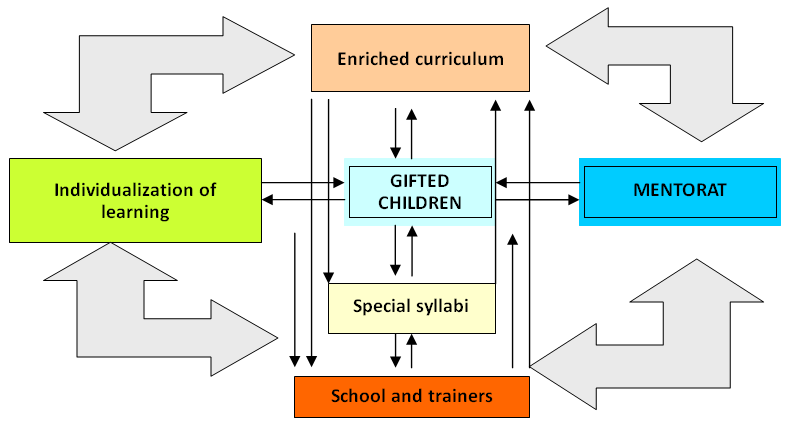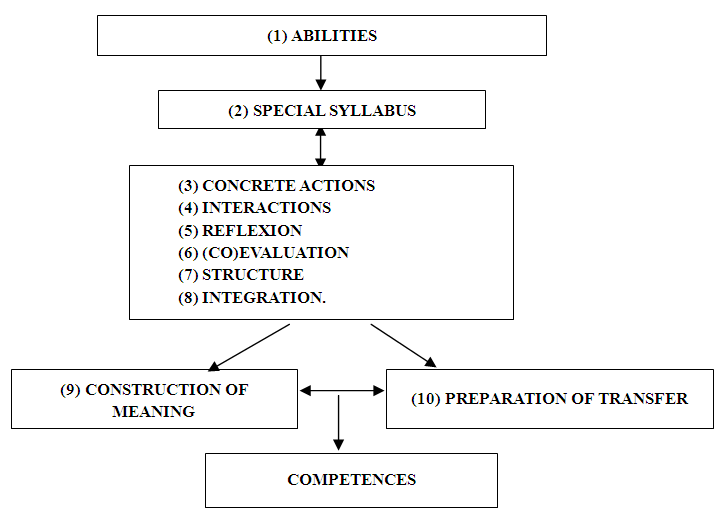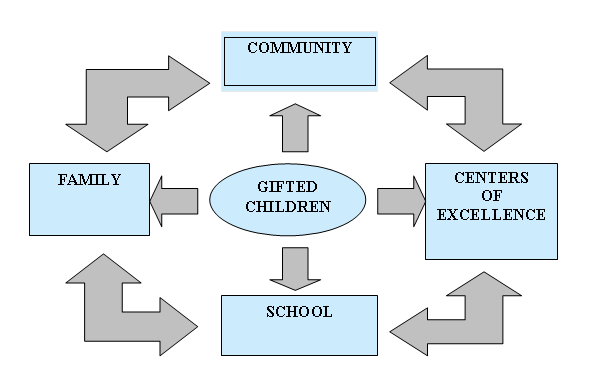-
Paper Information
- Paper Submission
-
Journal Information
- About This Journal
- Editorial Board
- Current Issue
- Archive
- Author Guidelines
- Contact Us
International Journal of Psychology and Behavioral Sciences
p-ISSN: 2163-1948 e-ISSN: 2163-1956
2015; 5(3): 134-141
doi:10.5923/j.ijpbs.20150503.05
Adapted Education for Gifted Children
Gabriela Kelemen
Faculty of Educational Science, Psychology and Social Sciences "Aurel Vlaicu" University of Arad, Romania
Correspondence to: Gabriela Kelemen, Faculty of Educational Science, Psychology and Social Sciences "Aurel Vlaicu" University of Arad, Romania.
| Email: |  |
Copyright © 2015 Scientific & Academic Publishing. All Rights Reserved.
Giftedness is attributed to a combination of factors coming from two directions: natural factors, hereditary factor, which is doubled by education, the two factors are mutually self-determinate. Gifted and in particular those from early age need some type of doubled requirement for some type of tolerance incentive purposes. It is therefore necessary that the gifted children be helped to do well in school, by the activities that reward their effort and expectations measure to determine thus be successful. The safest way in this regard is the differential treatment based on internal possibilities of gifted children, interests and skills in order to express their area of excellence. We propose in this paper a comprehensive program tailored for gifted children, educational intervention strategies and methods adapted gifted children, to contribute to their school success. This programme proposes an enriched curriculum. This enriched curriculum has final aim: to stimulate logical, enhancing creativity, self-realization, increase self-esteem, based on detailed properties of the theory and practice efficiency targets relevant and satisfactory results adapted gifted children capabilities.
Keywords: Gifted, Comprehensiv programme, Formative strategies, Enriched curriculum, Excellence
Cite this paper: Gabriela Kelemen, Adapted Education for Gifted Children, International Journal of Psychology and Behavioral Sciences, Vol. 5 No. 3, 2015, pp. 134-141. doi: 10.5923/j.ijpbs.20150503.05.
Article Outline
1. Instructive-Educational Strategies for the Gifted
- Successful instructive-educational strategies are pedagogic determinations which contribute to the school success of the gifted. The teacher-trainer [2] helps a child solve problems and tasks according to his outstanding abilities, when a real change in the education process is wanted and when it is made through learning methods adapted to the style of the gifted. These abilities are more complex from one grade to the other [2]. In its turn, school success brings about deep changes in the personality of the gifted. The relationship between pedagogic actions with beneficial effect on the mental configuration of the gifted involves encoding the pedagogic objectives in a system of actions and individualized, concrete, accessible didactic operation [3]. Passion for a certain educational area develops in direct relationship with the results obtained. The personalized training programme of the gifted is a set of methodological elements combined objectively to achieve positive results in increasing the efficiency of didactic activities with gifted pre-schoolers and pupils. The personalized training programme of the gifted contains mostly student centred methods. It is a programme aimed for the development of children according to their innate giftedness. The personalized training programme of the gifted has a flexible structure and it can be adapted to any age, level of study (from beginners to advanced) and to any subject of study. This programme tries to link properly the outstanding abilities of the gifted to efficient instructive-educational means. It also gives the opportunity to access alternative learning methodologies. The components of the experimental training programme The personalized training programme of the gifted are: enriched curriculum, individualized training and tutoring activities, all taking place simultaneously. The aim is to help the gifted evolve I the direction of their giftedness. One should take into account certain parameters connected to the formative stages of the intervention programme when implementing it (according to the activity grid presented in figure no 1 below) [4].
2. Enriched Curriculum
- More and more is spoken in Romania about the need to develop projects for the identification and education of the gifted.
 | Figure 1. The formative approach for the gifted |
|
 | Figure 2. Framework for developing a competence |
2.1. Educational Benefits of Enriched Curriculum
- The enriched curriculum aims to be an accessible and viable component of teaching activity with the gifted which focuses not only on informational aspects but also on formative ones by means of promoted values and attitudes. Creating a school environment centred on values and democratic relations.Promoting a system of cultural, moral and civic values according to educational and personal ideal.Creating a secure socio-affective climate.Involvement of the gifted in personal development.Development of socio-educational partnerships with family and other institutions with educational responsibilities in terms of excellence.Participation of the gifted in their own professional development and selection of their own way of training.Enriched curriculum based on well designed and efficiently implemented special syllabi focuses on the achievement of general competences in the personality of the gifted. The enriched syllabus for the gifted children aims to: add extra contents to the subjects from regular syllabi, use new data for each subject of study, addition of supplementary chapters, practical individual or group applications which would allow the creative usage of knowledge acquired at school or through other forms of training, alternative solutions, concrete problem solving [13].Enriched syllabi will be designed by teachers who work with that class according to the principles of modern education–a school for each child. Under organizational aspect, the individualization of education for the gifted will not take place in special classes. The training programme will take place in regular classes because these requirements are part of a modern teacher`s responsibilities:● knowledge and appropriate use of basic concept used in each subject of study; their revaluation in the identification of basic phenomena;● interpretation and explanation of different phenomena from a personal point of view;● evaluation and self-evaluation of the acquisition of objectives; ● referring in a critical and constructive manner to theoretical and practical contents;● using methods, techniques and tools appropriate for their ability and skills;● making connections between acquisitions from school subjects and other fields of knowledge and human practice. Special syllabi aim the acquisition of general competences and of competences specific for each unit based on interactive, dynamic and functional relations. Thus, a general competence is achieved through more specific competences and a specific competence can be versatile, contributing to the achievement of several general competences. The contents of the special syllabus for the gifted are tools are means selected for the achievement of specific competences. It depends on the teacher-trainer to choose the best training and assessment methodology. However, the teacher-trainer should take into consideration some conditions when developing and using these training strategies:● selection and differentiation of teaching methods and procedures according to the type of competence (psychopedagogic, social, management), to the complexity level of learning acquisitions (knowledge and understanding, explanation and interpretation, critical thinking, application), and to the knowledge level of the gifted;● encourage the use of methods of self-discovery and experimentation in order to improve learning performance of the gifted; ● planning differentiated educational strategies centered on preschoolers/ gifted pupils, taking into account the personality traits and their training needs;● used of plentiful resources, proper for the aims of the activity which involve the gifted in their training – papers with methodological-scientific character, multimedia systems, case studies, simulations etc.;● diversification (growth) of opportunities to integrate new information and communication technologies in teaching activity;● systematic assessment of the gifted` performance based on the aims of special syllabus; the use of oral, written tasks, practical tasks and alternative assessment methods (essays, projects, portfolios etc.).When applying special syllabi, teachers have to take into consideration conceptual connections and mutual conditioning between subjects of study. The teacher`s role is essential in any educational role. Shoshana Rosemarins tates that: each of the 50 Nobel laureates participating in Shavinina’s (2009) study had at leastone exceptional teacher who had acted as a role model [14]. The teacher will revalue the educational potential of the subject of study, will develop communication opportunities for the gifted, will favour decision making and autonomous thinking and will assume the role of ‘facilitator of learning’. Teachers will also ensure a stimulating and warm learning environment which promotes active learning, positive attitudes and attachment for the study group. When describing the profile of the proper teacher for the education of the gifted Renzulli (1992) refers to the following traits: the ability to apply knowledge to solve real-life problems; flexibility; openness; high energy; commitment to excellence; and ability to convey a passion for the subject matter [15].Creative application of special syllabus for the gifted requires flexibility in thinking. Thus, teachers need to be up-to-date with new information in their field, to examine critically their own activity and involvement in their professional development. The teacher will interact with colleagues who teach the same subject but also with others and will show his availability to cooperate in the best interest of the gifted. Teacher-trainers who work with the gifted are trained from a psychopedagogic perspective for the work with the gifted. They are appointed by the school inspector. Their passion for work and profession is revealed by receptiveness for novelty and promotion of valid innovation in their field. The aim of these activities is a more efficient teaching-learning-evaluation process in the work with the gifted. The stimulation of pre-schoolers/ pupils for the subject of study, the unit, daily activity.Pupils discuss the ideas related to the topic after/before the study of the unit under the teacher`s guidance. Setting the objectives: the teacher sets the contents, the way activities are conducted and their assessment.Division of tasks (the teacher monitors their difficulty level). Research/creation/investigation. Individual study of bibliographical resources used in practical applications according to the subject of study: problem solving, individual project, writing an article, stories, interviews with different people. Procession of data (individually or in group). The teacher can signal content errors, the organization of learning tasks and the accuracy of theoretical or practical-applicative project. The final layout: group discussions on the design and thoroughness of methodological approach. The teacher monitors and assesses individual results of gifted pre-schoolers/ pupils.Feed-back: - from the teacher;- from classmates (appreciations, questions, exchange of ideas etc.);- self-evaluation.The teacher will consider a few aspects that contribute to the achievement of objectives as part of an optimal unfolding of activities for the enrichment of the gifted in heterogeneous classes. Some of these activities are: the teacher`s good, systematic and constant preparation, pedagogic qualities that enable him to treat children differently according to their abilities, professionalism and dedication in the activity with children who show obvious differences. The teacher-trainer`s role in implementation of enriched curriculum in the activity with the gifted during curricular and extracurricular activities is essential [16]. The teacher is guided by the core curriculum but considers independently the intellectual and cognitive needs of the gifted. Thus, teachers adapt their teaching activity to the necessities of the gifted. They need to think about making the transfer from core curriculum to the enriched one in an accessible manner, adapted for the gifted and to select the most appropriate teaching means. Teachers have to find a balance between the mutual needs of the group and the individual needs.The teacher-trainer will combine modern and individualized teaching strategies (with the purpose of structuring and shaping learning situations). The use of these strategies allows the gifted to get actively involved in their training. The number of learning tasks given to the gifted needs to be in accordance with their cognitive abilities and the teacher`s support and intervention should be as rare as possible. The interventions have stimulation and correctional role, placing emphasis on the gifted cognitive independence. In terms of teaching-learning techniques, the teacher selects the most efficient and engaging ones. They adjust them to the intellectual development of the gifted so as to engage them in the superior level of their intellectual development. Important is also the learning environment and the mutual respect. The teacher assumes new roles: consultant, facilitator, moderator, even active participant in the learning process; he promotes learning by cooperation, balances individual workload with group workload, is in charge with classroom management, assesses continuously and formatively.
2.2. The System of Evaluation Standards
- The teacher-trainer aim is to stimulate the gifted, to facilitate learning and offer moral and emotional support as Hargrove (2005) stated: ‘the great teachers challenge the students while simultaneously offering support and making it ‘‘okay’’ to try and fail and try again’ [17]. The teacher-trainer, the mentor who works with the gifted has to consider some quality standards in terms of instructive-educational acts, such as:● pedagogical quality standards;● psycho-socio-physiological quality standards;● quality standards related to family life.The pedagogical quality standards refer to the following conditions that must be met by an educational process adapted for the gifted [18]:● the quality and modernity of curriculum (lesson plans, syllabi, course books);● psychopedagogic training of teachers who work with the gifted based on pedagogic skills, passion for work and teaching tact;● use of technical-material base in the instructive-educational activity with the gifted; ● use of modern teaching strategies that would determine the active-participative character of the gifted in the teaching process; they would also ensure the accessibility and operability of acquired skills;● individualized and differentiated handling of the gifted, aiming the revaluation of outstanding individual abilities (intellectual abilities, abilities, interests, aspirations, etc.);● ensuring the transfer of knowledge, strategies, thinking and patterns;● democratic relations between gifted pre-schoolers/ pupils and teachers;● promoting collaboration between school and family through meetings, partnerships, mutual actions;
|
2.3. Main Objective of the Research
- The main objective of our research is the analysis of the problematic of giftedness of children, of the methods and strategies used for the identification and education of gifted children and the implementation of the process of psychopedagogical intervention and assistance [19]. Educational-instructional intervention is welcome to the extent it contributes to the maximum development of the intellectual-creative potential of gifted children. Involvement of all responsible factors: instructors, primary school teachers, secondary school teachers, tutors, counsellors, psychologists etc (see Figure 3), as well as of the other educational partners, such as: families, cultural institutions, associations for the gifted and media, represent important aspects.
 | Figure 3. Factors involved in the education of gifted children |
2.4. Derived Objectives of the Research
- 1) Identification of gifted children in the Arad county, using as technique dissociated multiple criteria: school achievement, nominations by teachers and parents, denominations, intelligence coefficient, manifested creativity;2) Implementation of educational strategies in the group of children identified as gifted with a view to their development at an individual rate, along the line of endowment. Having as argument the above theoretical premises and the existence of our own experimental training program (enriched curriculum), we formulate the following general hypothesis for our experimental research: the proposed training program will determine the development of the gifted in accordance with their native endowment. The unfolding of the training program for testing the above hypothesis was based on the following objectives:01. structuring of a coherent training program based on specially devised programs;02. implementation of the training program by conceiving learning situations that should activate the exceptional intellectual potential of the gifted;03. continuous monitoring and assessment of the impact of the training program;04. analysis of the impact of the spraining program by the qualitative and quantitative interpretation of the school achievements of the fitted in the subjects of interest;05. reflecting upon the didactic experiment and its effects.
3. Conclusions
- The enriched curriculum is part of the training programme for the education of the gifted. This programme is elaborated by teacher-trainers based on special syllabi, structured on subjects of study (according to the options of the gifted). Besides knowledge studied by all children enrolled in mass education, the individualized contents contain information on subjects of cognitive interest for the gifted. The enriched curriculum aims at goals such as stimulation of logical thinking, enrichment of creativity, self-achievement, and increased self-esteem based on blending theory with practice [20]. Another aims is the achievement of relevant and satisfactory results according to the abilities of the gifted. Pre-schoolers and pupils acquire the newest acquisitions in their field of interest by means of enriched curriculum. They develop abilities that would turn into competences in their field of giftedness and they are also given the opportunity to develop according to their way of being. We believe that the enriched curriculum is an authentic strategy for the education of the gifted. It has proven itself to be a viable component in the promotion of “intellectual excellence”.
 Abstract
Abstract Reference
Reference Full-Text PDF
Full-Text PDF Full-text HTML
Full-text HTML
